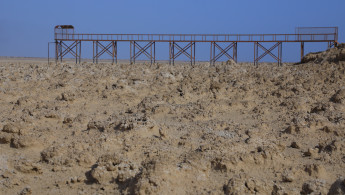Iraq mourns loss of Lake Sawa to climate change, illegal irrigation
Iraqis including President Barham Salih have this week mourned the loss of a lake in southern Iraq, which officials and activists say has completely dried up due to climate change and overuse.
Lake Sawa in Muthanna province was once a popular tourist destination and haven for biodiversity, but shrinking rainfall and increased draining by landowners and farmers for agricultural use saw the lake shrivel in size in recent years.
"In previous years, the water area decreased during the dry season... but this year, for the first time, the lake has completely disappeared," Iraqi environmental activist Husam Sobhi told AFP.
President Salih blamed the lake's demise on climate change.
"Its drying is to be lamented and a reminder of the existential dangers of climate change," he tweeted on Wednesday. "Confronting climate change issues must become a national priority."
|
Iraq's water resources ministry on Saturday said that the lake had dried up due to a combination of climate change and the building of illegal irrigation systems by farmers and landowners that used up water at nearby groundwater wells.
The ministry also warned that Lake Razzaza in the central province of Karbala was drying up, partly because upstream countries Turkey and Iran have limited the flow of water into Iraq.
Social media users posted images of other lakes in Iraq, asking if they could be next to completely disappear.
One posted an image purportedly of an almost completely barren Lake Hamrin with a black line drawn onto one of the corners, a mark customarily made to share news of a death.
|
Salih said Iraq faced a water deficit of 10 billion cubic metres by 2035.
Iraq is the fifth most vulnerable nation worldwide to the effects of climate change, according to the UN.





 Follow the Middle East's top stories in English at The New Arab on Google News
Follow the Middle East's top stories in English at The New Arab on Google News


